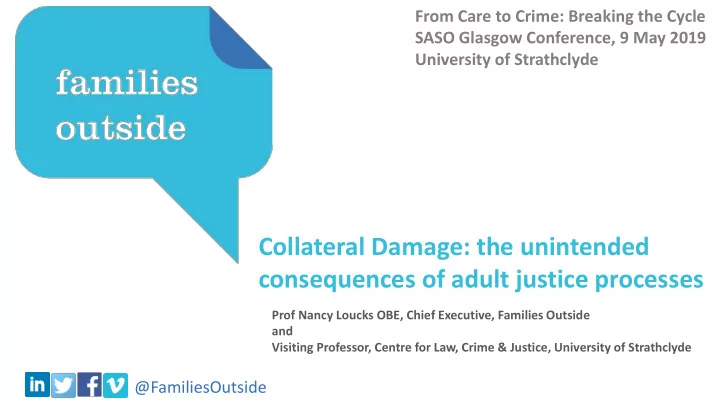

From Care to Crime: Breaking the Cycle SASO Glasgow Conference, 9 May 2019 University of Strathclyde Collateral Damage: the unintended consequences of adult justice processes Prof Nancy Loucks OBE, Chief Executive, Families Outside and Visiting Professor, Centre for Law, Crime & Justice, University of Strathclyde @FamiliesOutside
A few examples… Adverse Childhood Experiences (ACEs)
The basics (sort of…) 20,000 – 27,000? *Title image goes here* children in Scotland have a parent in prison each year Twice as many as experience a parent’s divorce. @FamiliesOutside #breakingthecycle
UN Nelson Mandela Rules 2015 We should know who these children and families are.
Adverse Childhood Experiences (ACEs) Imprisonment of a household member is one of the 10 Adverse Childhood Experiences (ACEs) proven to increase long-term risk to health and wellbeing.
Adverse Childhood Experiences (ACEs) Imprisonment of a household member is associated with a fivefold increase in exposure to other ACEs. (Turney 2018)
Adverse Childhood Experiences (ACEs) Imprisonment of a parent is recognised as an ACE, “but with a unique combination of trauma, shame, and stigma”, increased when the child also witnesses the arrest. - Tilley-Riley 2016: 10
Child Development
Think of a family….
When someone goes to prison… • Loss of income • Loss of housing • Shame • Victimsation • Cost and logistics of transport • Impact on children • Lack of information • Little involvement in the decisions that affect them
When someone goes to prison… HOUSING PHYSICAL & FINANCE & MENTAL HEALTH BENEFITS CHILDREN & VICTIMS YOUNG PEOPLE PRISONERS’ FAMILIES CRIMINAL CRIME JUSTICE PREVENTION TRAVEL & EDUCATION TRANSPORT
Children of Imprisoned Parents Higher risk of future imprisonment Higher risk of problems with physical and mental health Regressive behaviour/grief responses Multiple care arrangements What do you tell the children?
Children of Imprisoned Parents I'm feeling sad at the moment. My dad went to prison recently, and I'm not sure when he's coming back. My mum's really upset about it. Sometimes she's so depressed that she doesn't get out of bed, she just lays there still for the whole day. It's difficult for me when she does that, because I don't know how to cook my own dinners. I think my mum needs help, but I don’t know what to do. I don’t know who I should talk to. - young girl
Children of Imprisoned Parents Things aren't good at home. My mum drinks a lot, and my dad's in prison. I get so angry. I want to be a better person, but I've got myself involved with the wrong crowd. It's got me in a lot of trouble with the police - mainly for fighting. I realise what I'm doing isn't right, so I'm trying to come away from the group, but it's difficult. I know what they're capable of, so I'm scared for my safety. I just don't want to be like this anymore. I don't want to hurt people. - teenage boy
Think! Child & Family Impact Assessments
Some case law Kayani and Solliman [2011] EWCA Crim 2871: “It has long been recognised that the plight of children, particularly very young children, and the impact on them if the person best able to care for them (and in particular if that person is the only person able to do so) is a major feature for consideration in any sentencing decision.” ZH (Tanzania) (FC) (Appellant) v Secretary of State for the Home Department (Respondent) [2011] UKSC 4: “ We now have a much greater understanding of the importance of these issues in assessing the overall well-being of the child. In making the proportionality assessment under article 8, the best interests of the child must be a primary consideration. This means that they must be considered first .”
A bit more case law HH v Deputy Prosecutor of the Italian Republic, Genoa [2012] UKSC 25: [best interests]…“… calls for a sequencing of, first, consideration of the importance to be attached to the children’s rights (by obtaining a clear -sighted understanding of their nature), then an assessment of the degree of interference, and finally addressing the question whether [the government’s action] justifies the interference. This is not merely a mechanistic or slavishly technical approach to the order in which the various considerations require to be evaluated. It accords proper prominence to the matter of the children’s interests .” R v Petherick [2012] EWCA Crim 2214: “ Almost by definition, imprisonment interferes with, and often severely, the family life not only of the defendant but of those with whom the defendant normally lives and often with others as well. Even without the potentially heart-rending effects on children or other dependents, a family is likely to be deprived of its breadwinner, the family home not infrequently has to go, schools may have to be changed. Lives may be turned upside down by crime .”
Children of Imprisoned Parents ▪ 25% of children at risk of mental health problems ▪ Importance of caregiving parents and extended family ▪ Children often disturbed and confused, particularly at early stages ▪ Value of support from schools ▪ Good quality contact with prisoner parent central to resilience ▪ No difference for child wellbeing when mother v. father is in prison
A way forward…
UN Convention on the Rights of the Child Article 3 Article 2 Article 9 Article 12
UN Bangkok Rules 2010
Council of Europe recommendations 2018
See us! #breakingthecycle
Contact us: • Helpline – 0800 254 0088 • www.familiesoutside.org.uk
Recommend
More recommend